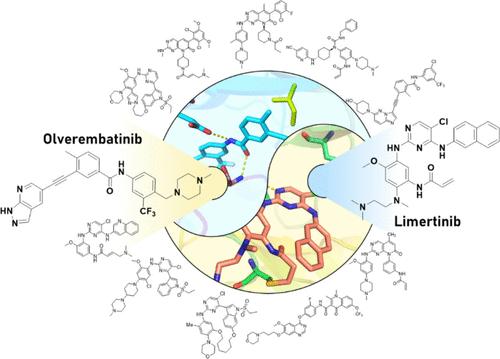Chemical Adaptation in Drug Discovery: The Medicinal Chemistry Journey of Olverembatinib and Limertinib in Overcoming Kinase Drug Resistance
IF 17.7
1区 化学
Q1 CHEMISTRY, MULTIDISCIPLINARY
引用次数: 0
Abstract
Drug resistance remains one of the biggest challenges in kinase inhibitor therapy, particularly in cancers where prolonged treatment fosters the emergence of resistant mutations. These mutations often alter amino acid residues within the kinase active site, reshaping the local chemical environment and disrupting critical drug-target interactions. The resulting changes – such as steric hindrance, loss of key hydrogen bonds, elimination of reactive residues, or other structural incompatibilities – can drastically reduce drug efficacy. To counter these effects, drug molecules must undergo tailored chemical adaptation – strategic modifications that align their molecular features (e.g., geometric shape, stereochemistry, acidity/basicity, and reactivity) with the mutation-altered changes in steric, electronic, and reactivity landscapes within the mutant kinase binding pocket. In this Account, we describe how the principles of chemical adaptation guided our rational design of small molecule kinase inhibitors to overcome clinically relevant resistance. Over the past 18 years, these efforts have culminated in the discovery and approval of two targeted therapies – olverembatinib and limertinib – as well as the advancement of several clinical-stage candidates.

药物发现中的化学适应性:Olverembatinib和Limertinib克服激酶耐药的药物化学历程
耐药仍然是激酶抑制剂治疗的最大挑战之一,特别是在长期治疗促进耐药突变出现的癌症中。这些突变经常改变激酶活性位点内的氨基酸残基,重塑局部化学环境并破坏关键的药物-靶标相互作用。由此产生的变化,如空间位阻,关键氢键的损失,活性残基的消除,或其他结构不相容,可以大大降低药物疗效。为了对抗这些影响,药物分子必须经过量身定制的化学适应-将其分子特征(例如,几何形状,立体化学,酸碱度和反应性)与突变激酶结合袋内的空间,电子和反应性景观的突变改变相结合的战略性修饰。在这篇文章中,我们描述了化学适应原理如何指导我们合理设计小分子激酶抑制剂来克服临床相关的耐药性。在过去的18年里,这些努力在发现和批准两种靶向治疗——olverembatinib和limertinib——以及几个临床阶段候选药物方面达到了顶峰。
本文章由计算机程序翻译,如有差异,请以英文原文为准。
求助全文
约1分钟内获得全文
求助全文
来源期刊

Accounts of Chemical Research
化学-化学综合
CiteScore
31.40
自引率
1.10%
发文量
312
审稿时长
2 months
期刊介绍:
Accounts of Chemical Research presents short, concise and critical articles offering easy-to-read overviews of basic research and applications in all areas of chemistry and biochemistry. These short reviews focus on research from the author’s own laboratory and are designed to teach the reader about a research project. In addition, Accounts of Chemical Research publishes commentaries that give an informed opinion on a current research problem. Special Issues online are devoted to a single topic of unusual activity and significance.
Accounts of Chemical Research replaces the traditional article abstract with an article "Conspectus." These entries synopsize the research affording the reader a closer look at the content and significance of an article. Through this provision of a more detailed description of the article contents, the Conspectus enhances the article's discoverability by search engines and the exposure for the research.
 求助内容:
求助内容: 应助结果提醒方式:
应助结果提醒方式:


